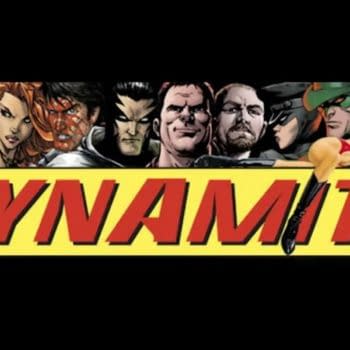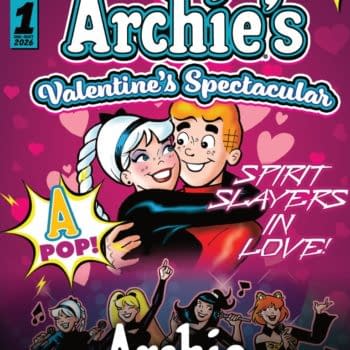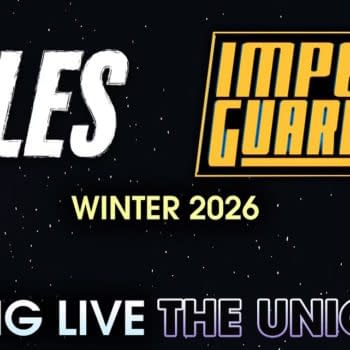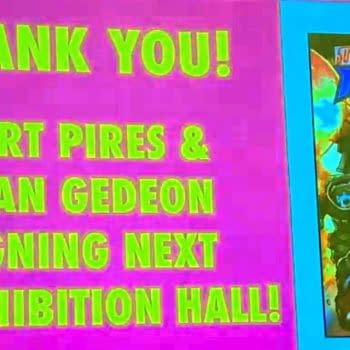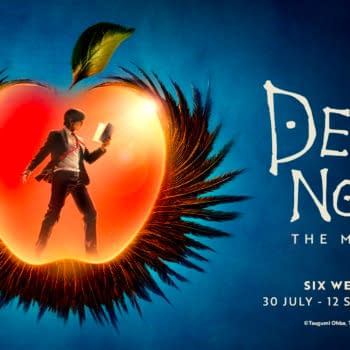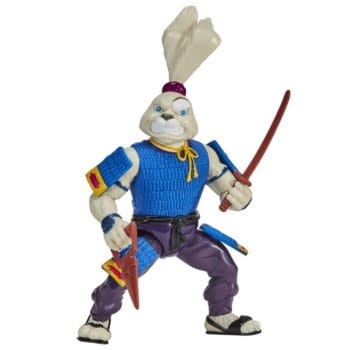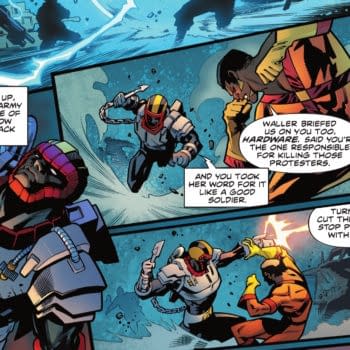Posted in: Comics, DC Comics | Tagged: comics dc comics, ComicsBrokeMe, dc comics, neil gaiman
#ComicsBrokeMe Stories- A DC Comics Special
As part of the #ComicsBrokeMe hashtag, a number of publishers were called out.. DC Comics got some attention from some very prominent folk.
Yesterday, after waking up to dozens of messages asking me to, I collated a selection of some of the #ComicsBrokeMe hashtag posts, trending in the light of the tragic death of comic creator Ian McGinty. A number of publishers were named along the way, from Marvel to Boom to Z2 Comics, citing low pay, no pay, increased workloads and impossible demands. A few people chose to name publishers. And DC Comics got some attention from some very prominent folk that stuck out rather. Here are a few examples, including Neil Gaiman quote-tweeting our original article.
Neil Gaiman: "When I started in comics in 1987 DC Comics was paying me $40 a page for a 24 page comic. That's worth somewhere between $120 and $160 now (and by issue 8 Sandman was making the same again each month in Royalties). How anyone survives on current page rates leaves me chilled."
That would be around $2500 a month, with inflation now. Rates now are a lot less – for most people. We then heard from creator Kwanza Osajyefo, best known now for the series Black, but who was an editor of DC Comics when they first started moving into digital comics with Zuda and followed by former DC editor Sarah Litt, and a bunch of creators naming DC.
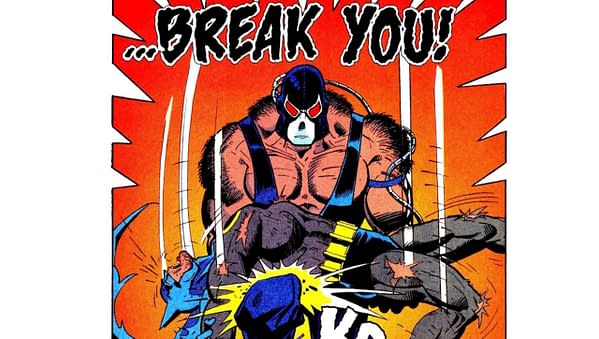
Kwanza Osajyefo: "Just gonna put this on the main. While DC had me lying to some creators to get them working for less than their average page rate, I signed vouchers to high-profile writers for $10,000 per issue. You read that number right. One high-profile writer made nearly my whole year's salary on a six-issue series that would never do numbers. Another was a year late on the book. I had an email from the head of my department in my inbox almost every day. But this creator was also an exec. If you're thinking, wait, that one high-profile check is the budget for a whole damn issue – you're right. My dumb-ass dept head blamed me for this exec eating the book's budget. I never had a choice in hiring that exec writer. Creators who blow up start getting excellent rates, but they need to start sharing that info with their peers so everyone can negotiate better. But you are invited into the Skull and Bones Club when you make the publisher big money. And it requires your silence. Here's a piece of advice I gave a colleague; if you get a Batman or Bat-adjacent assignment, ask for all the money. Batman books always got money. They won't give it to you, but they lying about their pockets. If we want to break the cycle of #ComicsBrokeMe all rising stars, big name, high profile creators – share your rates. Doesn't have to be on Twitter; we got Discord. But the "close the door behind you" move on helps the publisher f-ck you later – believe it. One high-profile friend told me he got $250,000 for a major limited series. You read that right. Yes. They deserved that much. They were that good. But in the meantime, publishers and nickel-and-dime everyone else."
Sarah Litt: "I remember when we paid that person all that money. It would have taken me over two years to make that much in those days and I had to write the vouchers. "Oh, this could pay my rent for how long?" on just one payment."
Kwanza Osajyefo: "And then we had to turn around and haggle writers on a $50 page rate."
Jamal Igle: "I was at a party years ago with an accountant who worked at DC while I was on exclusive contract, looked at me and said " We're not paying you anywhere near what you're worth. You know that, right?" It chilled me to the bone. Then it made me mad."
Andrew Wheeler: "#ComicsBrokeMe so many times, but the relevant one right now is how DC editorial pushed me to pitch JLQ and then blackballed me when they decided JLQ was bad publicity. They call it pride. I call it exploitation."
That would have been Justice League Queer, part of the Round Robin books. Used for DC Pride last year but then not seen since.
James Peaty: "Get a call just before Xmas '10. 'Wanna write 5 issues of Supergirl and dig us out of the shit?' Sure. Re-dialogue an issue overnight so that it can meet the ship date. Deliver chunk of new script for the artist (to keep the book on track) inside two days. Deliver first full script by Xmas eve. And then the next 3 scripts on time over the next 3 months. We never miss a ship date, the run was well received (I still get royalties from time to time). DC never employs me again. Thanks guys!"
Mayday Trippe: All I ever wanted to do was make superhero comics because they had such a positive impact on my life. But speaking out about sexist and racist stories and art in my beloved genre branded me a problematic indie wannabe for a time. I launched Project: Rooftop with friends and helped foster a new generation of superhero costume designers, many of whom have become comics superstars and designed new superhero looks that have become billion dollar box office icons. I gave Paul Levitz a postcard of my Supergirl at SDCC and he took it to licensing and said "hire this guy." I sold my Lois Lane, Girl Reporter pitch to DC with one email. Then spent years fighting higher ups who wanted it to be less heroic, non-canon, and make Lois more "girlie."
"Levitz left DC. The Didio Era of insulting all female fans and characters rolled on. My editorial ally at DC was let go in the move to the West Coast. I worked for years on series plots, revisions from various partner publishers, and was only ever paid $400 for the story concept. Meanwhile I was a new dad at the start of a degenerative neurological disorder I would spend the next decade and a half trying to get diagnosed and treated. I lost physical ability limiting day jobs and drawing with traditional materials got harder and harder."
"Geoff Johns had loved my work and told me to move to LA and he'd get me drawing Superboy backups digitally. I took a leap of faith, moved my wife and son to LA, and got a day job. Johns took me to lunch and told me it was weird that I'd taken him literally. He had introduced me to Didio at a party months earlier as "one of the 5 working writers who understands Superman." That move irreparably harmed my young family, my burgeoning career, and my worsening mental and physical health."
"Over the years, I've made comics since, at the pace I can manage, but life, my kids, and my finances have always made every effort to contribute to this incredible art field and the genre I love with the marrow in my bones a net negative for me personally.I sold another pitch to Marvel years later, only to have my editor get transfered to a different line, and their replacement hired another team to reboot the teen hero franchise I'd outlined. Finance guy called to offer me a few hundred more for my pitch.I asked if instead I could do a low-level variant cover for the launch, since I'd come up with the reboot and sold it to them on my concept art. They declined. So I declined the extra check in favor of just being mad about it."
"But I should've just taken it. These companies f-cked Jack Kirby and Bill Finger over and protected talentless middle managers. Why the hell should I have expected any different? I'm just some dipshit from Georgia who takes Batman too seriously. The one big success I had in this industry was ten years ago with my digital autobio story, Something Terrible. More people read my comic about Batman helping me through childhood trauma than bought the Walking Dead the month it launched."
"I did a Kickstarter I didn't manage well, due to its insane success and my enormous ignorance of how much work that would be while struggling to pay my rent with a minimum wage dayjob. Meanwhile my story had helped so many people, and I felt this calling to get it to any other survivors I could. An Oscar winning movie producer had me out to LA to talk about a film adaptation. They need Warner Bros approval to make it work with Batman, of course. Their chief creative officer wasn't interested in it apparently. Guy named Geoff Johns. Of course a few years later, rumors about him started popping up online, so maybe I would've regretted having our names attached on a project with the same subject matter."
"Anyway, I've been at the high point of being invited to the DC employee party at the Empire State building and the low point of trading in comics signed by my friends and heroes just for grocery and gas money. Took years to get shit diagnosed while being told to "avoid stress." #ComicsBrokeMe but if my life is a jumble of good and bad experiences, of talents, disabilities, learned skills, and natural instincts, my job now is to take each of these scattered Lego bricks and assemble them into something new for the sake of my son and the kids I teach. Haha and none of this includes the other side of my life trying to keep day jobs in education as an out nonbinary person and sexual abuse survivor in deeply conservative counties and maintain personal & professional relationships while my cognitive & physical symptoms increase. But this isn't #CisConservativesGenderNormsCapitalismAndAbleismBrokeMe"
Although DC gets more mentions, Marvel does get a few as well. Current Group Editor at IDW and former editor at Marvel Comics, Heather Antos replied to the original tweet by Osajyefo.
Heather Antos: And this doesn't just go for hired talent. As an assistant editor I would sign vouchers for talent who made more for a single issue than Marvel would pay me a year. A YEAR. At one point, a law got updated which made it illegal how low assistants were getting paid. Marvel was now being forced to pay us overtime. Marvel's response? They eliminated one week of paid vacation from our benefits."But free Disney passes!" they said. I couldn't afford to buy lunch.
Tim Seeley:I was an intern at marvel and was later always Painfully aware of the pay discrepancy between me and the people who hired me.
Rob Pilkington: i had a collaborator who (deservedly) got absorbed into Marvel assignments ASAP. when i reached out to him about possibly doing a pitch, he shared that he was having trouble getting paid for AN ENTIRE MINISERIES he'd already drawn for Marvel which is Disney btw.
Dennis Detwiller: A #Marvel bullpen guy once told me when I was trying to get into comics: "that's like trying to break INTO Auschwitz, kid, save yourself." A few years before his retirement, they fired him. I moved out west and did #MagicTheGathering instead. Thanks, Bullpen man. #ComicsBrokeMe
Jennifer M. Smith: I don't feel like I deserve to claim #ComicsBrokeMe, but I will say that the absolute worst part of my year at Marvel was having to beg creators — usually inkers, colorists, and letterers — to work at impossible speeds for very little money because the deadline was everything. It wasn't fair to them, it certainly didn't make the books better, and as an assistant editor making $28k/year (in NYC!) and trying to get over a dozen issues out the door each month, I had no power to change it. I left my PhD program before I got a chance to write my dissertation on labor in the comics industry, but I hope the #ComicsBrokeMe hashtag gets those stories in front of a wider audience. They need to be heard.
A Part Two to the original #ComicsBrokeMe is coming…






